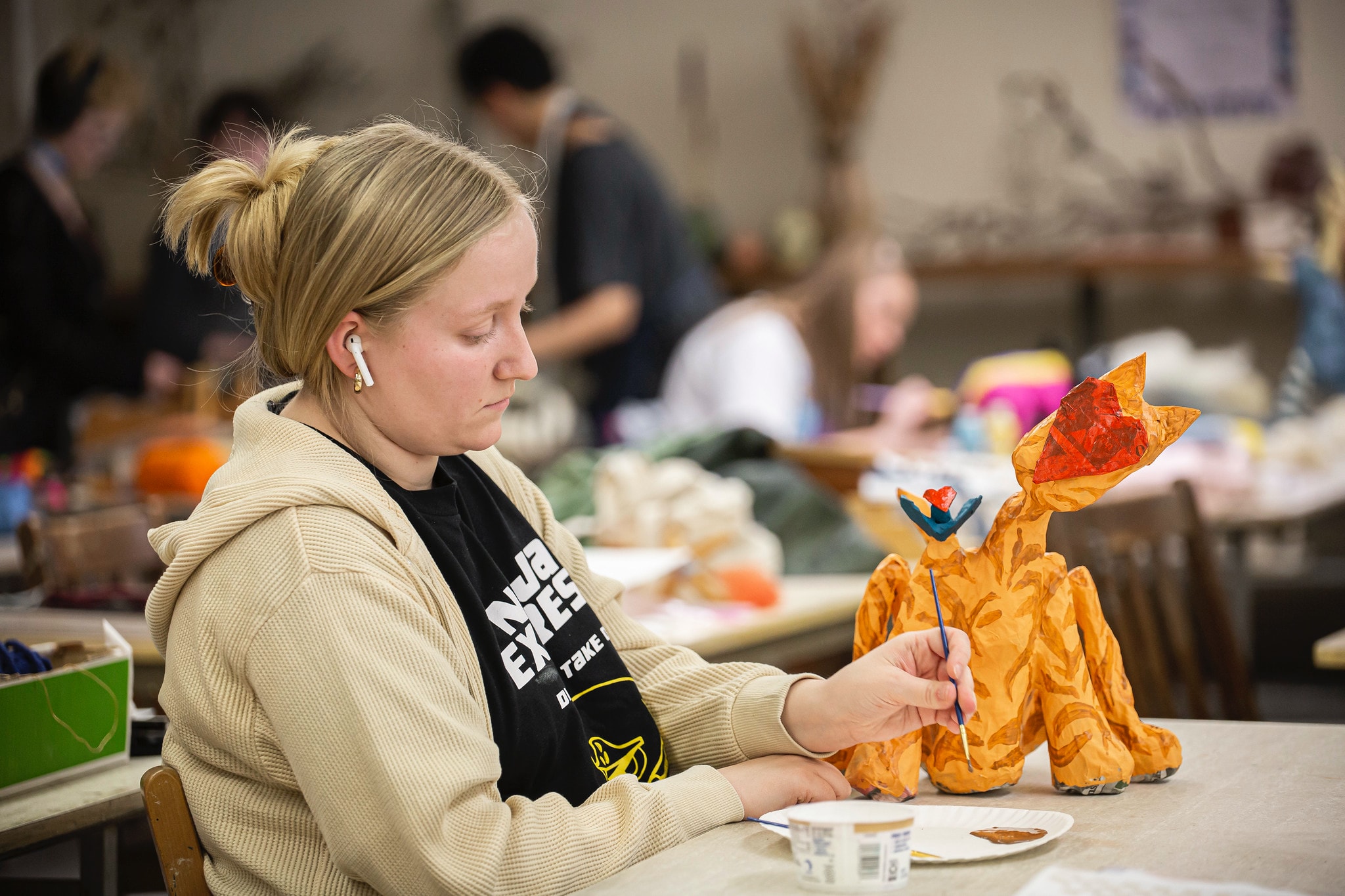K-12 Visual Arts Education
Prepare to inspire the next generation of creators with a Visual Arts Education degree from Manchester University. This program blends rigorous visual arts coursework with hands-on teaching experience, equipping future educators to thrive in the classroom. Graduate ready to make a meaningful impact in today’s evolving education landscape.

Visual Arts Education Degree and Minor Options to Prepare You for Teaching Grades K–12
Manchester University’s Visual Arts Education degree combines a rigorous foundation in art with hands-on classroom training to prepare future educators for teaching grades K–12. You’ll major in all-grade education with a concentration in the visual arts, which includes a combined curriculum of education and art classes and classroom teaching experiences each semester. Graduates successfully complete licensure programs to work with students in kindergarten through 12th grade. In addition to the bachelor’s degree, students can pursue a minor in Art or pair their studies with specialized licensure areas such as English Learners or Mild Intervention, broadening their ability to support diverse learners and meet the needs of today’s classrooms.
Program Information:
- 40-42 Credit Hours Visual Arts
- Required Education Coursework for Licensure
Minor | Art
- 24 Credit Hours
Location
- North Manchester
Why Choose MU for a Visual Arts Education Degree?

Supportive Licensure Pathways
Manchester’s education program is accredited in Indiana and nationally, helping students seamlessly earn their teaching license.
Early & Extensive Classroom Experience
Interdisciplinary Preparation
This degree combines art courses with education courses, developing both content mastery and teaching skills.
What You Can Do With Your Visual Arts Education Degree
K-12 Art Teacher
Inspire students through creative expression and artistic techniques.
Museum Educator
Design and lead educational programs in art museum settings.
Community Arts Coordinator
Plan and manage local art workshops and outreach events.
Curriculum Specialist
Develop engaging visual arts curricula for schools or districts.

Average Starting Salary for Visual Arts Education Degree Holders
Graduates entering the teaching profession in Indiana can expect competitive starting pay. According to the National Education Association, the average starting salary for teachers in Indiana is around $45,007. High school teachers earn an average of $66,222 annually, with a range between $53,783 and $82,341. These figures reflect the strong earning potential and high demand for qualified educators, making Manchester University’s Visual Arts Education degree a valuable investment in a rewarding and stable career path

How the Visual Arts Education Program Supports Your Growth
Early Classroom Experience and Fieldwork
From your first year, you’ll gain direct classroom experience in diverse school settings—urban, rural, and suburban. Manchester’s teacher education program integrates fieldwork throughout, allowing you to observe, assist, and eventually lead in grades K–12. This early exposure enhances your instructional confidence, connects theory with practice, and helps fulfill key licensure requirements before student teaching.
Accreditation and Outcomes: CAEP Accountability Measures
Manchester University’s Teacher Education Program is accredited by the Council for the Accreditation of Educator Preparation (CAEP) and meets four key accountability measures:
- Measure 1: Completer Effectiveness and P–12 Student Learning Observation and survey data show that Manchester graduates demonstrate instructional effectiveness and contribute to student growth.
- Measure 2: Employer Satisfaction and Stakeholder Involvement Employers express strong satisfaction with graduates’ preparedness. Feedback from school leaders informs ongoing program development.
- Measure 3: Candidate Competency at Completion High graduation rates and licensure exam success reflect the academic strength and teaching readiness of program completers.
- Measure 4: Ability to Be Hired in Area of Licensure 96% of recent graduates secure employment in their licensed teaching field within six months of graduation.
Supportive Faculty and Mentorship
Manchester’s education faculty are seasoned educators committed to mentoring and supporting each student. With a low student-to-faculty ratio, you’ll receive personalized academic advising, licensure guidance, and support throughout your student teaching journey. Faculty also collaborate with local school districts to help students find meaningful placements and professional connections.
Student Groups
Students in the Teacher Education Program can participate in a variety of co-curricular and leadership groups that promote community and professional development:
- Student Education Association (SEA): Join future educators across majors in this professional organization that hosts guest speakers, service projects, and networking events.
- Kappa Delta Pi (KDP): Manchester hosts a chapter of this international honor society in education, recognizing academic excellence and leadership among future teachers.
- Education Advisory Boards & Committees: Students may be invited to serve on advisory panels or assist with accreditation reviews and recruitment efforts.
These groups enhance your experience outside the classroom and support your development as an educator.
Curriculum Design and Licensure Preparation
Manchester’s Secondary Education curriculum is carefully aligned with state licensure requirements, ensuring you graduate eligible and well-prepared to teach grades 5–12. Courses emphasize content mastery in mathematics while integrating pedagogical training, adolescent development, assessment methods, and classroom management. The final semester includes student teaching, where you’ll gain full-time teaching experience under the guidance of a licensed mentor teacher. Manchester also provides test preparation support for Indiana’s licensing exams.
Career Placement Support and Alumni Success
Manchester University boasts a 96% placement rate within six months of graduation. Career and Professional Development services assist education majors with résumé writing, mock interviews, job search strategies, and access to statewide job fairs. Many alumni go on to become department heads, coaches, or district leaders, with support continuing well after graduation. This lifelong network is a hallmark of the MU experience.
Meet the Faculty
You Might Also Be Interested In These Programs

Frequently Asked Questions About the Visual Arts Education Degree
What grades does the Visual Arts education program prepare me to teach?
The Visual Arts education program at Manchester University prepares students to teach arts in grades K through 12. As a graduate, you’ll be licensed to work as a teacher, qualified to instruct courses. The program emphasizes real-world classroom readiness, pairing rigorous coursework with field placements in public school settings. The combination of in-depth learning and strong educator preparation ensures that you’re equipped to meet state teaching standards while also making a meaningful impact in the classroom. Students develop their teaching skills through early and ongoing fieldwork, culminating in a comprehensive student teaching experience. Upon graduation, you’ll be ready to guide the next generation of students in mastering essential art skills.
Can I also earn a minor in art while pursuing this degree?
Yes, students in the education program have the option to pursue a minor alongside their bachelor’s degree. Many future teachers choose this path to strengthen their knowledge and open doors to related fields. The minor typically includes courses which deepen your understanding while complementing your education coursework. Adding a minor enhances your qualifications when applying for positions as teachers or for advanced degree programs such as a master’s degree in art therapy or curriculum development. The flexibility of this dual approach helps you prepare for diverse roles, from teaching in public schools to potentially working in curriculum design or tutoring services. Completing the minor also reinforces content knowledge, ensuring you can confidently teach across a wide range of secondary courses and support students with varying learning styles and needs.
What teaching licenses will I qualify for after completing the program?
Graduates of Manchester University’s education program qualify for an Indiana education teaching license K–12. This credential allows you to work as a middle school or high school teacher throughout the state. Because the program is accredited by the Council for the Accreditation of Educator Preparation (CAEP), your teacher certification can often be transferred to other states, though specific requirements may vary. This level of accreditation reflects the quality of educator preparation and coursework delivered through the program. The curriculum includes training in English learning, classroom instruction, adolescent development, and assessment practices which are key components of effective teacher certification. Students graduate with more than just content knowledge; they also leave with strong pedagogical training and classroom experience. These qualifications make our graduates competitive candidates in the job market and ensure they’re fully prepared for long-term success in teaching.
How early will I get classroom experience in the program?
Field experience begins in your first year at Manchester University, setting the program apart from many others. From your first semester, you’ll observe real classrooms, assist teachers, and gradually take on instructional responsibilities. This progressive model gives students more than 100 hours of practical experience before entering the final student teaching semester. These field placements occur in diverse educational environments including urban, rural, and suburban, exposing you to a variety of classroom management styles and student needs. The goal is to ensure that education students develop confidence and competence in teaching long before graduation. You’ll work alongside mentor teachers and faculty advisors who guide you through lesson planning, classroom observation, and student engagement strategies. This approach supports deep learning and prepares graduates to teach visual arts with confidence in real-world school settings.
Are there specialization options like English Learners or Mild Intervention?
Yes, students in the education program at Manchester University can pursue specializations in areas such as English Learners or Mild Intervention. These optional licensure areas provide additional teaching skills and broaden your qualifications to support a more diverse student population. Specializing in English Learners helps you address the language and academic needs of multilingual students, while Mild Intervention prepares you to support students with learning differences or special education needs. These add-on credentials enhance your resume and allow you to reach more learners in both inclusive and specialized classrooms. The coursework for these licensure areas aligns with the university’s commitment to strong educator preparation, combining theory with hands-on instruction strategies. Adding one of these specialties makes you more competitive as a secondary teacher and gives you tools to adapt lessons for students with various academic and language backgrounds, improving overall learning and fostering equity in the classroom.
What career support or placement services are available after graduation?
Manchester University’s education program boasts a 96% placement rate for graduates entering the teaching field within six months of graduation. This success is supported by a comprehensive suite of career development services tailored to education majors. Students receive help with résumé writing, interview preparation, and job search strategies. The university also hosts annual education job fairs, where students can connect directly with school districts seeking qualified high school teachers and other educators. Faculty members and placement coordinators maintain strong partnerships with regional schools, helping you secure student teaching assignments and full-time employment upon graduation. Additionally, alumni often return to mentor current students, creating a robust network of support. Whether you plan to teach in Indiana or out of state, Manchester’s career services help ensure you’re prepared for every step – from licensure to classroom leadership. This commitment to long-term success reflects the university’s focus on real-world results and educator preparation excellence.
Visual Arts Education Learning Outcomes
Program Learning Outcomes
The mission statement of the Manchester University Department of Education is to bridge theory and practice, preparing students for professional careers that promote individual well-being, community engagement, and social justice.
Learning Goals: Graduates of our program will
- bridge theory and practice by applying their knowledge and skills in semester long internships or student teaching placements
- assess learning and development or the effectiveness of organizational programs designed for children, adolescents, and/or adults
- establish professional and reciprocal relationships with others invested in the emotional, physical, and cognitive well-being of others with whom they work
- create positive and caring environments for the development and academic progress of children, adolescents, and/or adults
- reflect on their role in the field of education as a means for bringing about social justice
InTASC Standards
1. Learner Development
The teacher understands how learners grow and develop, recognizing that patterns of learning and development vary individually within and across the cognitive, linguistic, social, emotional, and physical areas, and designs and implements developmentally appropriate and challenging learning experiences.
2. Learning Differences
The teacher uses understanding of individual differences and diverse cultures and communities to ensure inclusive learning environments that enable each learner to meet high standards.
3. Learning Environments
The teacher works with others to create environments that support individual and collaborative learning, and that encourage positive social interaction, active engagement in learning, and self-motivation.
4. Content Knowledge
The teacher understands the central concepts, tools of inquiry, and structures of the discipline(s) he or she teaches and creates learning experiences that make the discipline accessible and meaningful for learners to assure mastery of the content.
5. Application of Content
The teacher understands how to connect concepts and use differing perspectives to engage learners in critical thinking, creativity, and collaborative problem solving related to authentic local and global issues.
6. Assessment
The teacher understands and uses multiple methods of assessment to engage learners in their own growth, to monitor learner progress, and to guide the teacher’s and learner’s decision making.
7. Planning for Instruction
The teacher plans instruction that supports every student in meeting rigorous learning goals by drawing upon knowledge of content areas, curriculum, cross-disciplinary skills, and pedagogy, as well as knowledge of learners and the community context.
8. Instructional Strategies
The teacher understands and uses a variety of instructional strategies to encourage learners to develop deep understanding of content areas and their connections, and to build skills to apply knowledge in meaninful ways.
9. Professional Learning and Ethical Practice
The teacher engages in ongoing professional learning and uses evidence to continually evaluate his/her practice, particularly the effects of his/her choices and actions on others (learners, families, other professionals, and the community), and adapts practice to meet the needs of each learner.
10. Leadership and Collaboration
The teachers seeks appropriate leadership roles and opportunities to take responsibility for student learning, to collaborate with learners, families, colleagues, other school professionals, and community members to ensure learner growth, and to advance the profession.
Non-Discrimination in the Admission Process
Manchester University is committed to non-discrimination in campus life. The University does not discriminate on the basis of national origin, ancestry, race, color, age, sex, gender identity or expression, sexual orientation, familial status, religion, disability or veteran status in admissions or any area of campus life, including its educational programs, scholarships and loan awards, residence life programs, athletic programs, extracurricular programs, promotion and tenure policies and practice, and alumni affairs.
Manchester University is committed to carry out the provisions of Section 504 of the Rehabilitation Act of 1973 and the Americans With Disabilities Act, which provide for accessibility of University programs to the physically disabled.





